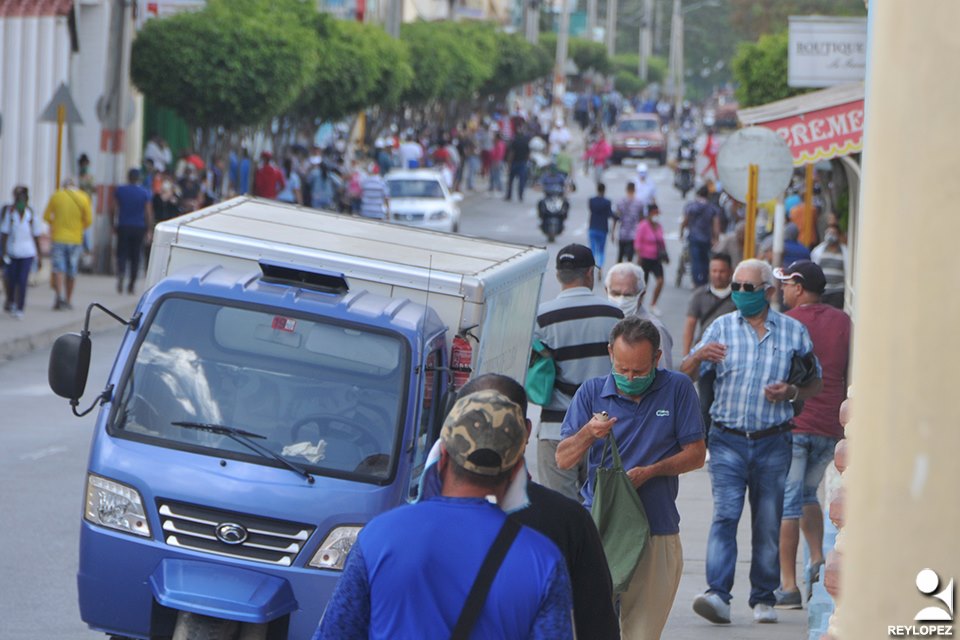
In order to understand why Cuba "goes out and finds" the COVID-19 in its neighborhoods, in an attitude of frank epidemiological offensive, it is necessary to contextualize, without remedy, in the communities of the Archipelago.
Las Tunas, Cuba.- The country has managed, with the efforts of many, to contain the bloodiest advance of the pandemic. Those who have walked, as 26Digital, among the delegates of the district who know their communities, and medical students who research, teach and learn, all at the same time; understand the details of the path and thanks those who, without vanity, are at the very epicenter of the dilemmas and solutions.
That is what I think about as I read on the Internet of collapsed health systems and dead bodies on the streets of this sad and visceral America of ours. Fortunately, the voice of Alvaro Caballero, president of the number one defense zone in this capital city, takes me out of my thoughts and, always with the mask, tells of what is now his daily dynamics.
It is easy to notice the tiredness in his eyes and the extreme exhaustion in his body and in the seven people who accompany him assiduously on the community research for people with possible symptoms of COVID-19, in the intense work of researching and protecting the health of the most vulnerable.
"This is a very complex area because it occupies the center of the city of Las Tunas. Therefore, in addition to the population, it has cultural and administrative institutions and an important group of stores and shopping centers, which make it possible to maintain a constant flow of citizens here, both in the queues and in the unavoidable procedures. The location of the Central Highway is also important, and most of the transport circulates through this jurisdiction.
"Everything becomes our responsibility. We work together with the National Revolutionary Police (PNR) and the Integral Direction of Supervision in the municipality.
Although there has been a gain in risk perception and we see quite a lot of discipline, all attitudes are not favorable. The bicycle taxis continue, people who arrive daily to queue for basic necessities and we have even found people arriving from other parts of the province, in the middle of this situation, looking to stay in a rental house to buy chicken or oil, some, even to resell."
I know that Álvaro and his team have remarkable experience in such matters. Because this is the COVID-19, but before that, there have been droughts, hurricanes, shortages... And that is one of the country's great strengths: the systematic work of the delegates of the People's Power makes the stage more organized in the face of such a dilemma. In any block, the neighbors know the one who lives alone, the one who enters less, the one who needs more.
"We maintain control of the warehouses, especially on the days when the basic basket is sold. We organize the 212 vulnerable people to whom we have to bring breakfast, lunch, food and medical care to the home.
This is not an exclusive task of these times since many of them remain alone the whole year and the People's Council already entrusted, in some cases, the social workers and other neighbors with this sensitive mission. Now, of course, we control it more. We are grateful to the teachers and workers of the National Institute of Recreation and Sport (Inder in Spanish) who have joined the support.
"The life of the city has three relevant moments. The first one is during the day, with great activity due to the queues and the rhythm of this region which, although smaller, is still remarkable for us. Then, the night, and then, after 12:00 am and until dawn.
"In that last hour, citizens appear looking for services that are currently paralyzed, in each schedule we keep the controls. We have identified places where indiscipline is frequent, among them, the so-called little park of the flowers, on Colon Street, which is basically prone to the presence of addicts to ingest alcoholic beverages."
It's nice to hear them talk, down to the last detail, about everything they do for people. They know exactly which grandparents live there, although many do not even know that they are looking after them. They are concerned about the people who do not have masks in the blocks yet and the Federation of Cuban Women (FMC) coordinates and resolves that situation.
They are grateful for the dedication of the 42 students of the University of Medical Sciences who are already part of the community research, a task which they understand as "defining" in order to win the battle. And they are aware that it is very difficult to change the habits of those who, already in their senior years, have given them all for Cuba.
"It is very complex to tell a grandfather who goes every day to look for bread that he cannot do it. Sometimes they don't want the youngest one in the house to go, they need to go out, to feel useful. Fortunately, they are beginning to understand and, at least in this area, we are satisfied with the attitudes and results so far.
I hear them explain and I know that in these spaces they are giving their souls for health and hope. It is not only the tiredness on each face, but also the determination to say and the care to knock on every door and make every initiative important from any voice in the name of life.